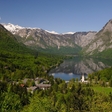

You're planning a trip, and you don't want it to cost the earth.In fact, you'd like it to be as positive an experience as possible, not just for you but for your destination and the environment. What are the best sources of inspiration and ideas? How do you make ethical choices? And how do you avoid all the greenwash out there?
These days, most of us reckon we're sophisticated travelers. We have high expectations. We love nature, respect local cultures and choose our itineraries, transport and accommodation with care.
We certainly won't be fobbed off with hollow gestures like those pious little "Help Save The Environment" notices on the towel rails of hotels, which have no other green policies in evidence. There's much more to eco-conscious travel than that.
Ask yourself: what does ecotourism mean to you?
The term "ecotourism" has been around since the 1970s, but there's still some uncertainty about what it really means. All true ecotourists share an interest in the natural world, and a desire to experience and share it in a low-impact manner. In 2008, the Global Sustainable Tourism Council set out some guiding principles, but no single system exists to judge how well businesses follow them.
This shifts some responsibility onto consumers – which is not entirely a bad thing. Before you book a trip, it's worth deciding on some minimum criteria of your own, then seeking out a company or itinerary that will deliver. You might decide, for example, that what's most important to you is staying in locally-owned, off-grid accommodation, or taking a nature tour which contributes to conservation.

Tourism accreditation schemes can offer useful pointers
Wouldn't it be great if all you had to do was look for a little badge on a website, to be certain that you were booking a genuinely green trip?
According to the International Ecotourism Society, there are currently more than 170 ecotourism accreditation schemes worldwide. Their priorities differ and none are comprehensive – some charge a sizeable registration fee, so many good businesses choose not to opt in – but they can be good sources of travel ideas. Travelife and Green Globe are two of the best.
TripAdvisor has its limitations
TripAdvisor's GreenLeaders program, which invites eco-friendly hotels and B&Bs to apply for a GreenLeader badge, is the biggest of its kind. While it has plenty of plus points – it's free, it's transparent and it encourages businesses to view green policies as a marketing asset – it's not perfect.
It relies on businesses scoring themselves for eco-friendliness, in the knowledge that consumers could demand a refund if they're dissatisfied. However, it's unrealistic to expect many consumers to make qualified judgements on green policies. Without mandatory third-party scrutiny from ecotourism experts, the scheme's credibility is in doubt.
TripAdvisor reviews can be a big help, if you're simply deciding between two hotels, but for early-stage planning, you're far better off consulting travel experts and professionally-researched guidebooks and articles. "TripAdvisor is not as comprehensive as you might think, and its search filters are limited," says Deborah Regen of online eco-travel resource EcoTourLinQ. "If you try searching for advice on adventure travel or ecotourism, you won't necessarily find what you're looking for."

Award-winning businesses are worth supporting
Some industry insiders are skeptical about awards for the "best" hotel, tour operator and so on. According to Nigel Vere Nicoll, Chief Executive of the African Travel and Tourism Association, many tourism award schemes are "little more than popularity contests." He recently wrote: "Is it perhaps time for us to consider a uniform awards standard? Is this our 'FIFA moment' – and the time for a radical review of the process?"
However, responsible tourism awards tend to have more integrity than most. Whether they're open to all, based on industry nominations or decided by public vote, they're subject to so much scrutiny that it's unlikely a greenwasher would make it to the finals.
It's well worth checking out the winners and finalists of respected global, regional and specialist awards, such as Tourism for Tomorrow and the World Responsible Tourism Awards.
In 2015, the Tourism for Tomorrow Environment Award went to Soneva's superb eco-lodges in Thailand and the Maldives. As well as setting up the Maldives' largest solar installation, they're a significant force in global discussions on sustainability in tourism.
Runner-up Laguna Lodge in Guatemala has a policy of reducing its carbon emissions by serving no meat or fish, even though 95% of its guests are omnivores. It also uses renewable energy and offers hospitality training and healthcare to its staff, all of whom are indigenous Mayan.

Context is king
Because of the costs involved in creating a national ecotourism policy and supporting green businesses, the term "eco" is used and understood differently around the world. "Definitions tend to be subjective," says Lesley Schofield of All Points East. "In South East Asia, countries which are newly emerging from years of strife or unrest place less emphasis on sustainability and recycling than, say, Thailand, which has a long history of tourism."
Specific local circumstances also shape every tourism company's decisions. An isolated safari lodge, for example, may legitimately call itself an eco-lodge because it uses renewable energy and supports community projects, even though it may ship in food and wine from distant cities, due to a lack of suitable local sources.
Carbon offsetting isn't the answer
Once hailed as the solution to every conscientious traveler's concerns, carbon offset schemes have fallen out of favor. Since 2009, Friends of the Earth has written them off as "a dangerous distraction" from the reality that we should all try to reduce greenhouse gas emissions. Leading responsible tourism expert Dr Harold Goodwin believes they're basically a licence to pollute. "They're like medieval pardons," he says. "They allow you to go on living exactly as you did before."

Eco-friendliness and community-friendliness should always go hand in hand
Some green policies – minimizing power consumption, for example – are easy to define and demand. Others are less tangible, but equally important. An area that ecotourists sometimes overlook is the extent to which tours, hotels and B&Bs contribute to community wellbeing and development.
Angama Mara, a new luxury safari lodge in Kenya's Masai Mara, is an excellent example of a place to stay which, through its ethos, inspires people to fall in love with a landscape, its wildlife and its people. The owners decided from the outset to hire the best staff around and treat them well, providing superb quarters and excellent working conditions. It's paying dividends; the service and atmosphere are second to none.
Instead of wearing its ethical principles on its sleeve, Angama Mara lets guests make up their own minds. If you express an interest in conservation, local education or community development, they'll give you all the information you need, even matchmaking you with a specific project which you might want to support.
"Our biggest concern is always the pressure that human expansion is having on wild places," says co-founder Steve Fitzgerald. "We need to prove to our staff and to the wider community that they are better off using their land for wildlife rather than for cattle, goats and maize. And we love helping our guests be part of that.



